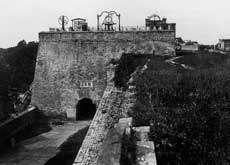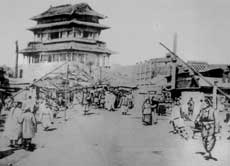| Protecting the Old Capital |
| http://www.sina.com.cn 2005/04/11 18:29 thats China |
Protection or Demolition? At the end of 2003, a book titled Cheng Ji (The Evolutionary Record of Beijing), recording the history of the city's settlement since 1949, was published and went on to become a bestseller the following year. Li Hui, a critic for the People Daily, said, "This is a book of great value. There were a lot of disputes about the resettlement of Beijing, but this is the first book with detailed and comprehensive data that describe the changes of Beijing." There was another reason why the book flew off the shelves and into the hands of common readers. It happened to agree with a strong social sentiment: Preserve old Beijing. Author Wang Jun's original plan was to write a biography of Liang Sicheng, and Wang uses a heavy tone to record Liang's persistent attempts to preserve the Old City. Wang's deep regret for the city's past and concern for its future are easily read between the lines.
Shu Yi, a well known writer and a member of China's top advisory body, the Chinese People's Political Constructative Conference (CPPCC), is a rigid protector of old Beijing. As the son of Lao She, famous for his books reflecting hutong life, Shu Yi has a deep feeling for the old courtyard homes. "Courtyards shut out noise and dust, which helps create their unique flavor," Shu says. "We can plant trees and flowers in the yard and find ourselves close to nature whenever we want. In the downtown areas, it is quite relaxing and peaceful to live in courtyards." "The protected zone of hutongs shouldn't be restricted to one zone," he adds. "It should cover a large area, and within this area high buildings should be prohibited and the old hutongs and courtyards should be arranged and retained as they always were." Opinions opposite to those of Shu Yi are also very strong, however. Wu Huanjia, architectural professor at Qinghua University, believes that it is nearly impossible to protect all of the old hutongs and courtyards in Beijing, for the capital is a multi-functional city. He points to Paris as an example. It was a well-preserved historical city, but without the reconstruction of old Paris during the reign of King Louis the 14th (1643-1715), the famous Place de l'Etoile and the Champs-Elysees would never have come into being.
Some modern writers point to the hutongs and courtyards as a representation of a detrimental, obsessively traditional Chinese way of thinking, a sentiment Zhang Yimou portrayed in his influential film Raise the Red Lantern. Li Guowen points out that the style of the courtyards have played an impassive role in the psychology of Chinese residents. "It is like a box. It is obvious that residents in the courtyards are shut off from the outside,"symbolically restricting people's perceptions. Even hutong residents themselves have significant complaints. One female resident of the Doufuchi Hutong, a hutong located north of the Drum Tower, says, "Many travelers, especially foreigners, love to look around these hutongs and admire us who live here. But they don't know what bad conditions we live in. Sometimes, four to five people may share one small room. Water seeps in through the roof on rainy days. We have to use the stove to stay warm in the winter. The greatest headache is going to the public toilet [which is located outdoors]: the bad smell in the summer and the chilly wind in the winter." (When asked her name, the woman eyes went wide and she responded in an unpleasant tone, "It's none of your business!") Despite the strong opinions on both sides of the debate, most can reach an agreement: Beijing's character lies not only in cultural sites such as the Great Wall and the Imperial City, but also scattered in the old hutongs and courtyards. "If I had enough money, I would love to buy a courtyard for spending holidays, but I don't like the traditional ways of life that goes on in those settings," says Yu Xuyuan, who grew up in the hutongs of Xuanwu District but is now accustomed to comfortable living inside a modern high-rise.
|
|
|
|
|
|
| Annotation |
| 新 闻 查 询 |
| 热 点 专 题 | ||||
| ||||
|
教育频道意见反馈留言板 电话:010-82628888-5747 欢迎批评指正
新浪简介 | About Sina | 广告服务 | 联系我们 | 招聘信息 | 网站律师 | SINA English | 会员注册 | 产品答疑
Copyright © 1996 - 2005 SINA Inc. All Rights Reserved
版权所有 新浪网![]() 北京市通信公司提供网络带宽
北京市通信公司提供网络带宽


